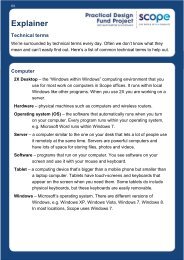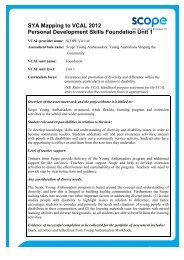Positive behaviour support Getting it right from the start
Positive behaviour support Getting it right from the start
Positive behaviour support Getting it right from the start
Create successful ePaper yourself
Turn your PDF publications into a flip-book with our unique Google optimized e-Paper software.
<strong>Pos<strong>it</strong>ive</strong> <strong>behaviour</strong> <strong>support</strong>: <strong>Getting</strong> <strong>it</strong> <strong>right</strong> <strong>from</strong> <strong>the</strong> <strong>start</strong> - Facil<strong>it</strong>ators reference manual 7<br />
PowerPoint 9<br />
PowerPoint 10<br />
*<br />
*<br />
What is pos<strong>it</strong>ive <strong>behaviour</strong> <strong>support</strong>?<br />
<strong>Pos<strong>it</strong>ive</strong> <strong>behaviour</strong> <strong>support</strong> (PBS) is not a simple answer to <strong>the</strong> complex reasons why people<br />
show <strong>behaviour</strong>s of concern. The PBS approach includes <strong>the</strong> systematic ga<strong>the</strong>ring of relevant<br />
information, conducting a functional <strong>behaviour</strong> assessment, designing <strong>support</strong> plans,<br />
implementation and ongoing evaluation. Immediate response strategies for <strong>the</strong> management<br />
of serious episodes of <strong>the</strong> <strong>behaviour</strong> are also addressed, but <strong>the</strong>re is a belief that <strong>the</strong> best<br />
<strong>behaviour</strong> <strong>support</strong> happens when <strong>the</strong> <strong>behaviour</strong> is not happening; hence <strong>the</strong> strong emphasis on<br />
proactive strategies.<br />
PBS is based on decreasing <strong>behaviour</strong>s of concern and improving <strong>the</strong> person’s qual<strong>it</strong>y of life.<br />
<strong>Pos<strong>it</strong>ive</strong> <strong>behaviour</strong> <strong>support</strong> planning tells us <strong>the</strong> best way to work w<strong>it</strong>h an individual who shows<br />
<strong>behaviour</strong>s of concern and gives us ways to improve <strong>the</strong> qual<strong>it</strong>y of life for <strong>the</strong> person and does<br />
not just deal w<strong>it</strong>h <strong>behaviour</strong>.<br />
This approach places an emphasis on <strong>the</strong> need for responsiveness to a person’s feelings and<br />
needs and has <strong>the</strong> following defining features:<br />
• valuing <strong>the</strong> person, deliberately building a sense of self-worth, and acknowledging all attempts<br />
at pos<strong>it</strong>ive interaction<br />
• creating s<strong>it</strong>uations where <strong>the</strong> person is placed at <strong>the</strong>ir best advantage<br />
• acknowledging and trying to interpret what <strong>the</strong> person is communicating via <strong>the</strong> <strong>behaviour</strong><br />
• analysing <strong>the</strong> functions of <strong>the</strong> <strong>behaviour</strong><br />
• teaching <strong>the</strong> person o<strong>the</strong>r ways to meet <strong>the</strong>ir need or communicate <strong>the</strong>ir feelings<br />
• gently <strong>support</strong>ing and leading <strong>the</strong> person to a calmer state<br />
• providing encouragement and feedback about personal successes along w<strong>it</strong>h aspects of<br />
difficult s<strong>it</strong>uations <strong>the</strong> person may have handled well.<br />
In groups develop a defin<strong>it</strong>ion of what pos<strong>it</strong>ive <strong>behaviour</strong> <strong>support</strong> means to you.<br />
What does pos<strong>it</strong>ive <strong>behaviour</strong> <strong>support</strong> mean to <strong>the</strong> people you <strong>support</strong>?<br />
Group defin<strong>it</strong>ions should include:<br />
• PBS is not a simple answer or a quick fix.<br />
• The PBS approach includes <strong>the</strong> systematic ga<strong>the</strong>ring of relevant information, conducting<br />
a functional <strong>behaviour</strong> assessment, designing <strong>support</strong> plans, implementation and ongoing<br />
evaluation.<br />
• PBS is based on decreasing <strong>behaviour</strong>s of concern and improving <strong>the</strong> person’s qual<strong>it</strong>y of life.<br />
• PBS has a strong emphasis on proactive strategies.

















